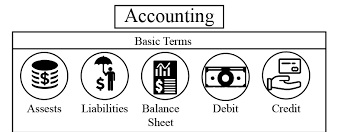

Basic accounting terminologies
1.Assets: Resources owned by a business that has monetary value and are expected to provide future benefits.
2.Liabilities: Obligations of a business to pay debts or other financial obligations.
3.Equity: Equity refers to the ownership interest in a company or property, representing the residual value after all liabilities have been paid off.
4.Revenue: It refers to the amount of money a business earns through the sales of its products or services
5.Expenses: It refer to the expenditures incurred by a business while carrying out its operations and generating revenue.
6.Profit/Loss: The difference between revenue and expenses.
7.Depreciation: The distribution of the cost of a physical asset over its useful life.
8.Amortization: Amortization is the practice of allocating the cost of an intangible asset over its useful life.
9.Accruals: Recognition of revenue or expenses that have been earned or incurred but not yet received or paid.
10.Balance Sheet: A balance sheet is a financial statement that provides information about a company’s assets, liabilities, and equity as of a particular date.
11.Income Statement: The Income Statement is a financial report that details a company’s earnings and expenses during a given time frame.
12.Cash Flow Statement: A financial statement that reports a company’s inflows and outflows of cash over a period of time.
13.Trial Balance: Trial balance is a financial statement that lists all the accounts in a company’s general ledger and their corresponding debit or credit balances.
For further details visit: https://vibrantfinserv.com/service-detail-25.php
14.General Ledger: A record of all financial transactions made by a business.
15.Chart of Accounts: A list of all accounts used by a business to record financial transactions.
FAQs:
To visit- https://www.incometax.gov.in
